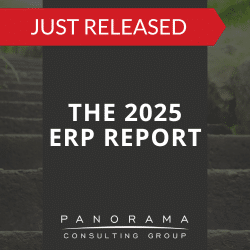During an ERP implementation, terminology and buzzwords are thrown around like cards in a game of 52 pickup.
When project team members misuse terminology, confusion abounds. Executives think the new system will solve all their business problems, and end-users stumble around looking for the truth.
Whether you’re an executive planning a digital transformation or an IT professional implementing enterprise software, it’s essential to uphold the correct usage of all ERP buzzwords.
Today, we will dissect the most misused ERP terminology and buzzwords, shedding light on their true meanings. Keep reading to ensure you have a clear understanding of the language that drives modern enterprise systems.
ERP Terminology: Fact and Fiction
1. Workflow Automation
Definition: The design, execution, and automation of processes based on workflow rules where tasks, information, or documents are passed from one user to another.
Misunderstanding: Workflow automation is sometimes seen as basic task automation. However, it involves orchestrating complex sequences of actions and interactions, ensuring efficiency and consistency across business processes.
Example of Misuse: A team leader might say, “This product costing tool is great for workflow automation,” misunderstanding the broader scope of end-to-end process automation.
The 2025 ERP Report
72.6% of respondents said they've already deployed AI at their organizations. Learn about AI adoption and other ERP trends by downloading our latest report.
2. Data Lake
Definition: A storage repository that holds a vast amount of raw data in its native format until it is needed.
Misunderstanding: A data lake is often confused with a data warehouse. Unlike a data warehouse, which stores structured data, a data lake can store unstructured and semi-structured data, making it more flexible but also requiring more sophisticated data management.
Example of Misuse: An IT manager might say, “Let’s put everything in the data lake for easy access,” without realizing that a lack of proper data management can turn the data lake into a data swamp.
3. Total Cost of Ownership (TCO)
Definition: A financial estimate intended to help buyers determine the direct and indirect costs of a product or system.
Misunderstanding: When our ERP selection consultants work with clients, they often think of TCO only in terms of initial purchase price. We always emphasize that TCO includes all costs associated with acquiring, implementing, and operating an ERP system over its entire lifespan.
Example of Misuse: A procurement officer might say, “This material requirements planning (MRP) system is cheaper upfront, so it has a lower TCO,” ignoring the ongoing costs of maintenance, upgrades, and support.
4. Data Migration
Data Migration: The process of moving data from old systems to a new system.
Misunderstanding: Data migration is seen as a simple data transfer task, but it involves complex activities such as data cleansing, mapping, and validation.
Example of Misuse: A project manager might say, “We just need to copy the data over,” underestimating the importance of data quality and structure in the new system.
5. Organizational Change Management
Definition: Preparing, supporting, and helping individuals and teams in making an organizational change.
Misunderstanding: Change management is often underestimated and seen as part of project management. However, it focuses specifically on the human aspects of change, which is critical for successful ERP implementation.
Example of Misuse: A CEO might say, “We’ll manage the change as it happens,” not recognizing the need for a proactive and structured change management strategy.
6. Artificial Intelligence (AI)
Definition: Technology that enables systems to learn and improve from experience without being explicitly programmed.
Misunderstanding: AI is often thought to encompass everything “automated,” even basic automation like reconciling a general ledger. In reality, AI refers specifically to technologies that continually learn and adapt to perform tasks requiring human intelligence.
Example of Misuse: A marketing manager might say, “Our automated purchase requisition process is AI,” when it is actually a simple rule-based automation tool.
7. Business Intelligence (BI)
Definition: Technologies, applications, and practices for the collection, integration, analysis, and presentation of business information to support better decision-making.
Misunderstanding: BI is sometimes thought to be the same as reporting. However, BI provides deeper insights and analytics capabilities beyond standard reporting. Our ERP implementation consultants often encourage clients to consider the benefits of implementing advanced analytics, such as predictive and prescriptive analytics.
Example of Misuse: An analyst might say, “We have BI because we generate financial reports,” not realizing that true BI involves advanced data analysis and visualization tools.
8. Customization
Definition: Altering the code of the ERP software to meet specific needs.
Misunderstanding: Customization is a term often used when someone means to say “configuration.” Configuration means setting up the software’s built-in options without altering its code.
Example of Misuse: A project sponsor might say, “We need to customize the accounting module to fit our accounts receivable processes,” without realizing that this is actually a simple configuration that doesn’t require altering code.
9. Modules
Definition: Individual components of an ERP system, each dedicated to a specific business function, such as finance, HR, sales, or inventory management.
Misunderstanding: The term “module” is often used interchangeably with the term “application,” but they are quite different. Modules are components within an ERP system, while applications are software programs designed for specific tasks. These can be part of a module or a standalone tool.
Example of Misuse: A user might say, “I love this new finance application,” when they mean the finance module of the ERP system.
Additional ERP Terms to Know
This ERP terminology isn’t necessarily misused, but these are still important terms to add to your vernacular:
- Cloud ERP refers to ERP software hosted on a cloud computing platform rather than on-premises within an enterprise’s own data center. Cloud ERP offers benefits such as lower upfront costs, scalability, and accessibility from any location with internet access.
- Independent Software Vendor (ISV) refers to a company that develops, markets, and sells software solutions designed to run on one or more platforms. An independent software vendor provides specialized software solutions that can be integrated with ERP systems, enhancing their functionality to meet specific business needs.
- System Integration is the process of ensuring various software systems and applications work together seamlessly. This is critical for ensuring data consistency and streamlining business processes across different departments and functions.
- Scalability is the ability of an ERP system to handle increasing amounts of work or its potential to accommodate growth. This capability ensures that the ERP system can support business expansion without requiring a complete overhaul.
- Real-Time Data is information that is available for use immediately after collection, without significant delay. Real-time data enables businesses to make timely and informed decisions based on the most current information available.
- Key Performance Indicators (KPIs) are measurable values that demonstrate how effectively a company is achieving its key business objectives. They can be used to evaluate project success and to monitor progress over time.
- Data Governance is the management of data availability, usability, integrity, and security in an enterprise. This ensures that data is accurate, consistent, and secure.
Learn More About the Language of ERP
Understanding ERP terminology and buzzwords is vital for making informed technology purchases. By demystifying these terms, you can avoid common pitfalls and leverage the full potential of your ERP investment.
Contact our independent ERP consultants below for a free consultation.













